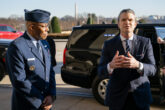January 26, 2017
Civil Order and Governance as Military Responsibilities
In April 2003, as U.S. forces closed in on Baghdad, chaos and disorder began to break out in the city of more than six million residents. As civil order broke down, the lack of guidance and forethought that U.S. leadership had put into the responsibility of U.S. forces for maintaining civil order in their newly conquered territory became apparent. Because there was no planning or guidance on how to handle looting, commanders in Baghdad decided to focus on defeating the last remnants of the Iraqi military and did little to maintain order in the capital.
Eighty-five years earlier, another Western military force had advanced on a key Middle Eastern city and found itself faced with a similar situation. General Edmund Allenby, the commander of the British Army’s Egyptian Expeditionary Force, had dispatched a force, the Desert Mounted Corps under Australian Lieutenant General Harry Chauvel, to take the Ottoman city of Damascus. Allenby gave Chauvel specific orders on how the city was to be taken and administered in order to strengthen the British position for the postwar settlement. When civil disorder began to break out in Damascus, however, Chauvel prioritized maintaining civil stability above his orders from Allenby. Although his decision greatly complicated the postwar situation and was a clear violation of direct orders, there is no question that he viewed maintaining civil order as an implied task of the utmost military importance, and Allenby supported his decision.
The vastly different manner in which American commanders viewed their responsibility to maintain civil order in Iraq from their British and Australian counterparts in World War I speaks to the way each group viewed the roles and responsibilities of a military force. The U.S. military’s willingness to cede postwar stability operations to civilian authority, even an authority within the Department of Defense (DOD), would have been foreign to Allenby and his lieutenants in 1918. This truth goes beyond the fact that travel and communication are much easier today, or even the formative experiences of Allenby and Chauvel (both veterans of the Boer War) compared to their American counterparts, and speaks to an evolution of thinking among American military professionals.
Read the full report at National Defense University Press.
More from CNAS
-
National Security Has a Human Capital Problem and There’s No Fast Way Out
National security doesn’t really exist without the military forces and supporting civilians to carry it out. Recruitment remains a problem for the armed forces. And there’s a ...
By Katherine L. Kuzminski
-
The Department of Defense’s Breakthrough Nuclear Moment Risks Slipping Away
Unless they act, the Department of Defense’s breakthrough nuclear moment may vanish before it really happens....
By Will Rogers
-
Sharper: National Security Human Capital
U.S. national security depends on the nation’s ability to leverage the expertise of uniformed warfighters and the highly skilled civilian professionals who develop and impleme...
By Charles Horn & Taren Sylvester
-
Hegseth Brings the Culture War to Combat
The fundamental challenge of military leadership lies in creating cohesive teams that can work together in an environment of mortal risk and, when called upon to do so, use le...
By Dr. Jason Dempsey




